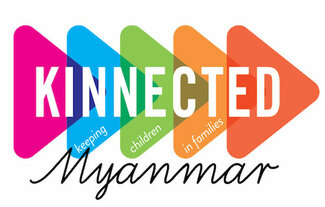Kinnected Myanmar was officially founded in 2015 by ACCI with local commitment from orphanage directors in Myanmar. Its mission is to help children in institutions to grow in a family and community, uphold the rights of every children and ensure their safety.
The organization commits to working in partnership with orphanage directors with the goal of safely and sustainably supporting young people to leave institutions and integrate into community-based settings.
Kinnected Myanmar's core value is "every children must grow-up in a healthy family environment".
Where they operate
Contact this organization about:
Organization Size
Headquarters Location
No. 308, Yatarnar Housing,
Nine miles, Pyay Rd., Mayangone
Yangon,
Myanmar (Burma)
Organization Type
Main Areas of Work
Raising Awareness In Communities
Raising awareness about:
- the disadvantages of institution for children
- UNCRC guidelines on child's right and protection
- the biblical basis for strengthening parenting skills
- being pro-active against human trafficking
- the root causes of family separation
- children belonging in families
Community development activities include:
- awareness of hygiene promotion in community
- hygiene promotion for school students
- community Bio-Sand Filtration (cBSF) installation in community partnership with Samaritan's Purse
Family Reintegration of Children from Non-Governmental Orphanages
- Assessment of children and orphanages
- Family tracing
- Family and community assessment
- Determination of best interest of the child and plan development
- Preparation for reunification (both children and family)
- Child reunification
- Post reunification support and monitoring
- Complete reintegration and case closure
Vocational Training and Care Leaver Support
- Assessment of children and orphanages
- Best interest of the child determination and plan developing
- Assessment and talking with training center or training school
- Vocation training support
- Monitoring and support
- Internship and Job seeking
- Financial and mental support for independent living
- Case closure
Capacity Building
- Caregiver training to orphanage directors and caregivers
- Child protection training to orphanage directors and Christian leaders
- Case management training to social workers
Monitoring
Children that reintegrated to families and communities have been monitored by social workers until they are stable and meet standards according to the guideline.
We asked this organization to tell us a little more about their learning and knowledge sharing practices. Here is what they said
We are most proud of the reunification of children with their biological families. We are also proud of protecting children from abuse and exploitation and finding solutions that are in the best interest of the child.
- Alternative care
- Family reintegration for children in non-governmental orphanages
- Be the child-center and focus (BIC) rather than ministry oriented
- Children belong in families not orphanages
Our projects were reviewed on a quarterly basis by supervisors or managers as well as an annual review by the Board of Directors.
Regularly share learnings/practices in child protection network in the country such as the National Child Right Working Group and the Child Protection Working Group in Yangon. We exchange with other partners, organizations, families and communities on our thoughts and knowledge.


